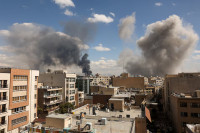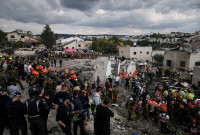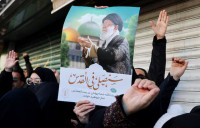World
Chandrayaan-3 lands on moon in historic moment for India
The Chandrayaan-3 is expected to remain functional for two weeks, running a series of experiments including a spectrometer analysis of the mineral composition of the lunar surface.
Reuters
An Indian spacecraft landed on the moon on Wednesday in a mission seen as crucial to lunar exploration and India’s standing as a space power, just days after a similar Russian lander crashed.
“This is a victory cry of a new India,” said Prime Minister Narendra Modi, who was seen waving the Indian flag as he watched the landing from South Africa, where he is attending the BRICS summit.
Scientists and officials clapped, cheered and hugged each other as the spacecraft landed and as the government now looks to spur investment in private space launches and related satellite-based businesses.
“India is on the moon,” said S Somanath, chief of the Indian Space Research Organisation (ISRO) as the Chandrayaan-3 spacecraft landed on the lunar south pole.
This was India’s second attempt to land a spacecraft on the moon and comes less than a week after Russia’s Luna-25 mission failed. People across the country were glued to television screens and said prayers as the spacecraft approached the surface.
Chandrayaan means “moon vehicle” in Hindi and Sanskrit. In 2019, ISRO’s Chandrayaan-2 mission successfully deployed an orbiter but its lander crashed.
The Chandrayaan-3 is expected to remain functional for two weeks, running a series of experiments including a spectrometer analysis of the mineral composition of the lunar surface.
Rough terrain makes a south pole landing difficult, and a first landing is historic. The region's ice could supply fuel, oxygen and drinking water for future missions.
“Landing on the south pole (of the moon) would actually allow India to explore if there is water ice on the moon. And this is very important for cumulative data and science on the geology of the moon,” said Carla Filotico, a partner and managing director at consultancy SpaceTec Partners.
Anticipation before the landing was feverish, with banner headlines across Indian newspapers and news channels running countdowns to the landing.
Prayers were held at places of worship across the country, and schoolchildren waved the Indian tricolour as they waited for live screenings of the landing.
Children gathered on the banks of the Ganga river, considered holy by Hindus, to pray for a safe landing, and mosques in several places offered prayers.
At a Sikh temple, known as a gurduwara, in the capital New Delhi, Petroleum Minister Hardeep Singh Puri also offered prayers for Chandrayaan.
“Not just economic, but India is achieving scientific and technological progress as well,” Puri told reporters.




 9.78°C Kathmandu
9.78°C Kathmandu














